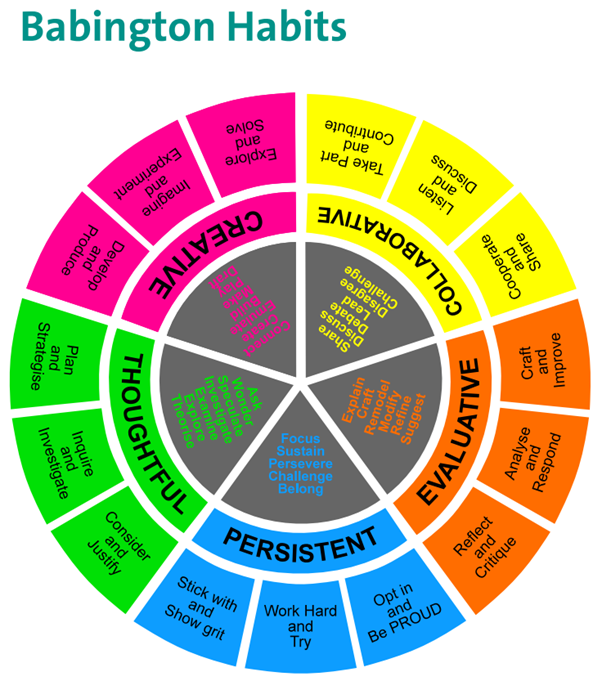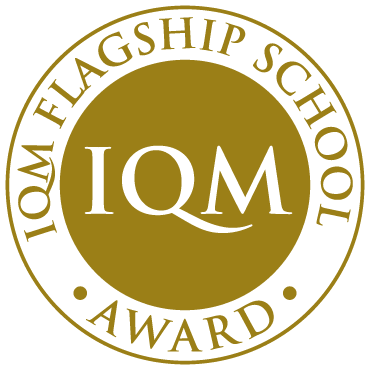Intent, Implementation & Impact
If you would like more information about the curriculum at Babington Academy please contact office@babington.lwlat.org.uk or call 0116 2221616.
Intent
We are proud of our unique context and the richness this brings to our curriculum offer. We want our students to learn a broad selection of subjects in depth in order to allow them to open doors and grasp hold of their hopes and dreams for the future. Our curriculum is well planned and progressive and seeks to build on the prior knowledge of students, make links and develop their understanding in all areas of their learning whilst addressing the knowledge gaps students may join us with, given the wide range of different starting points our students have from our large number of feeder schools across Leicester City. It is our intent that students will build their knowledge, skills and understanding through the study of a knowledge rich, mastery curriculum. Our curriculum has our students and their needs at the heart of it, so that all students leave Babington with the knowledge, skills and confidence to thrive in a challenging and ever changing world. We understand that a curriculum deep in cross curricular links is the best way to make learning ‘stick’ for students and to support them in transferring all that they learn into long-term memory. It is because of this that our middle leaders worked closely together at the design stage to map out the links that there are across subjects and work to review and update this regularly.
At KS4 students are offered a free choice of courses alongside their core offer and are well-supported to make informed and ambitious decisions by members of the senior leadership team. Students who require extra support with their learning do so in mainstream lessons and our DSP students are well supported to access the curriculum to be successful. For our most vulnerable students we offer a nurture curriculum which is offered on a stage not age basis and is driven with a keen literacy focus.
We feel strongly that it is our moral responsibility to offer our students opportunities beyond the traditional classroom curriculum and see that whilst we are building knowledge in lessons it is of equal importance to build cultural capital and a character for learning. Because of this, opportunities to build knowledge, cultural capital and character for learning are all carefully planned into our long term, medium term and short term plans. The well-being of our students is at the core of all we do and because of this our well-being curriculum is taught by all staff in designated time on a weekly basis, this allows us a depth of time to concentrate on a wide range of issues from topical debates using ‘Votes 4 Schools’ to the Prevent agenda and British values.
It is our intention that students are empowered through our rich, broad and balanced curriculum to make ambitious choices at Post-16 and to unlock a successful future regardless of their starting point or background and support is in place for all students in this process.
Implementation
The 4 D’s
The 4 D’s model is the structure that our staff use to plan and deliver learning for our students, in a way that leads to students getting an exceptional quality of education. This model, and everything included within it, is based on the science behind learning and has been proven to help students ‘know more and remember more.’ The structure isn’t simply used over every one hour lesson… although it can be, it could also be used across a range of lessons. This just depends on what it is that the students are learning.
Do Now
The start of every lesson is key! We plan lessons to always start with a retrieval activity. This ensures that students are regularly recalling key information from their long-term memory, which (as the science proves) will help them to remember more information over time.
Discover
This part is all about supporting students to understand where the learning is going and/or why we’re learning this. By including this within our lesson planning students will be able to relate information to the end goal, again meaning that they are much more likely to remember it later on!
Delve
Delve makes up the majority of our lesson time. This is because learning something new takes time and effort! Within this part of the learning we plan to:
- give students time to really look deeply into the information
- make them ‘think hard’ about the learning (there’s nothing to gain from making it easy!)
- let them ‘struggle’ and be in ‘the learning pit’ (this sounds strange but struggling and making mistakes is a key part of learning something well)
- give them the tools to help themselves (they’ll gain much, much more by working it out for themselves (with some guidance), than being told the answer)
- provide time for them to practice over and over again, until they can do it fluently
Demonstrate
The end of each ‘learning journey’. Here students are tasked with demonstrating the knowledge, skills and understanding that they have gained throughout this journey. Most importantly, this has to be what they can do, not what others can do and so we ask our students to do this independently, using only their own resources and not relying on the support of anyone else (including the teacher!)
Developing positive Learning Habits
At Babington, a key aim for the implementation of our curriculum is for students to develop good learning habits. We have considered which attributes and behaviours we want to see from our learners across the curriculum and lessons are planned with this in mind.
We want students to be:
- Persistent
- Collaborative
- Creative
- Thoughtful
- Evaluative
All of these characteristics take time to develop and staff will deign activities that challenge students to show these attributes. Our Learning Habits are not hierarchical, none is more important than the others, so we have designed a wheel that demonstrates their equal importance.
 We believe that if we can help students to develop good Learning Habits and behaviours, they will be able to flourish throughout school and beyond.
We believe that if we can help students to develop good Learning Habits and behaviours, they will be able to flourish throughout school and beyond.
Impact
The impact of our curriculum is measured through the external examination results of all of our students, many of whose results do not feature in performance table information. We believe that it is important to look at how the curriculum has had an impact on everyone we teach, regardless of their starting point. The impact of each medium term plan is monitored by our subject leaders who check student outcomes against the intended impact outlined in the medium term plan. We track the progress and attainment of our students through the monitoring of learning statements, teachers identify what students know, can do and understand using Go4Schools which allows for transparency in approach across the entire school. Our use of personalised learning checklists and, in some areas of the school, question level analysis ensure that when required intervention can be targeted at precise and specific knowledge gaps to ensure that all students achieve their potential. Progression from each schema is clearly identified across the schemata of the school and our cross curricular planning ensures that this progression is not just mapped as linear across one subject but includes progression points to other subjects too. The detailed Quality Assurance schedule checks the impact of the curriculum through a wide range of activities which allow all aspects of learning to be evaluated. Subject areas pair up and support one another to quality assure each other’s curriculum area. It is key for us that our students leave Babington with the emotional and intellectual literacy to be effective and active global citizens who have qualifications which give them choices alongside a desire to be life-long learners.







 ↑
↑


